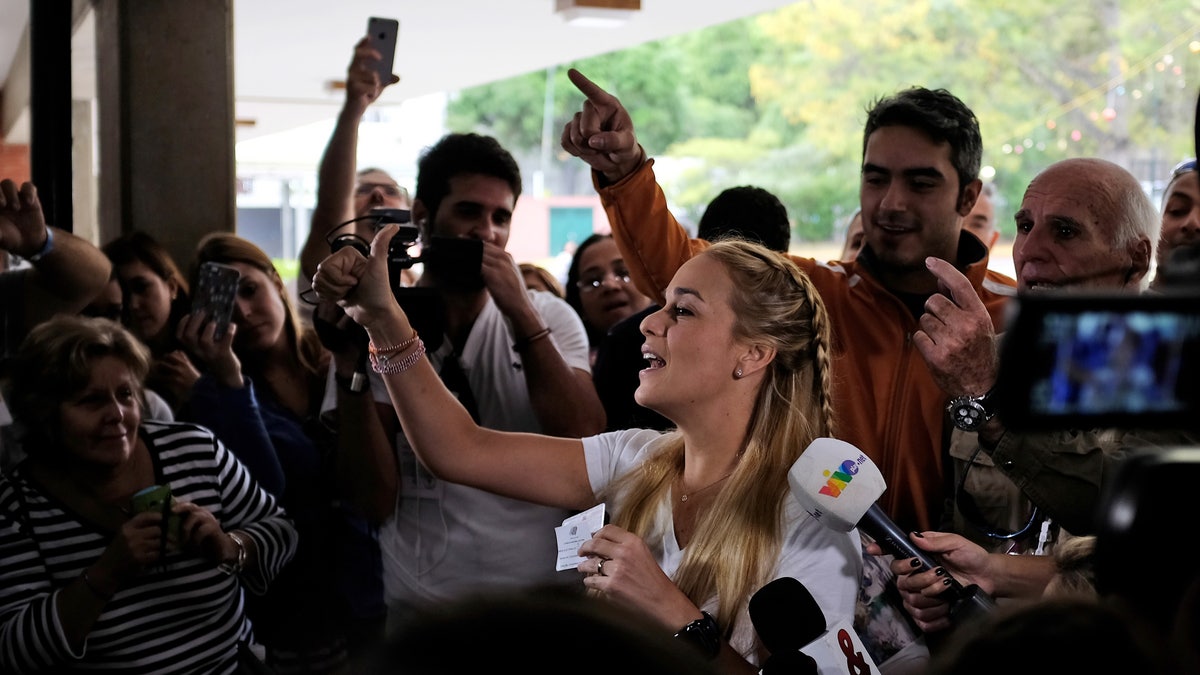
Lilian Tintori, the wife of jailed opposition leader Leopoldo Lopez, arrives to a polling station in Caracas, Dec. 6, 2015. (ap)
Millions of Venezuelans defied government intimidation and fearmongering on Sunday, voting for candidates from the opposition Democratic Unity Roundtable (MUD) in legislative elections. Voter participation reached 74 percent. The result: after 16 years of Chavismo dominance in the National Assembly, the opposition has at least won a majority of seats in the 167-member legislative body.
Caracas swarmed with anxiety in waiting for the first official results to be released. Just after midnight, the National Electoral Council declared that MUD candidates received at least 99 seats while the government’s United Socialist Party of Venezuela (PSUV) secured 46 seats. Who wins the remaining 22 seats will determine the degree of actual power for the opposition.
Momentum is with the opposition. It must now show that it can effectively govern for the presidency to one day be in its reach.
Expectations of a government defeat were high going into the vote. Pre-election polls predicted the opposition would walk away with a 20 percentage point victory. What is impressive about this opposition win is it was done despite all the levers of the state apparatus working overtime to try to eke out a PSUV victory.
The elections may have been relatively fair on voting day, but the weeks and months leading up to it were rife with manipulation of the democratic process. Public resources were doled out to essentially buy votes, favorable press coverage was only given to PSUV candidates, voting cards were designed to confuse opposition voters, and prominent candidates barred from the ballot.
Still, the end result is that ten years after mistakenly boycotting these elections, opposition candidates now technically hold a number of powers once they take office on January 5, 2016. For one, holding at least the simple majority, they can choose new leadership in the National Assembly. The constitution also gives the majority the right to approve an amnesty law, which would free Leopoldo López and other prominent politicians in jail or under house arrest. Budget approval would also technically fall to the opposition.
In the likely scenario the MUD secures two more seats, it wins a qualified majority by holding three-fifths of the National Assembly. That’s significant as it would allow for the opposition coalition to revoke presidential decrees and to censure and remove certain government officials. With 112 seats—a scenario the MUD says is within reach—the opposition’s powers increase substantially including giving it the ability to modify organic laws, amend the constitution, and even call for a constituent assembly.
But this list of new powers assumes two things. First, that the opposition will stay united when in the National Assembly. One of the top roadblocks to the opposition wresting any control from chavismo has historically been the opposition itself. It is a coalition that unifies a variety of interests and strategies, coming together at key moments but then splintering when times get tough. Now in control, the pressure is even greater to keep the coalition together.
Second, and even more significant, it is uncertain whether the state apparatus will truly share powers with a chamber that can no longer be counted on to simply rubber stamp policies. The PSUV has near total control of the state and wants to keep it that way.
On election night, President Nicolás Maduro was conciliatory, giving the illusion of true democracy to try to silence international critics. How long will that last?
He is increasingly isolated in the region. With the inauguration of President-elect Mauricio Macri in Argentina on December 10—who has called for Venezuela to be kicked out of the Mercosur bloc if it doesn’t respect democracy—Maduro has lost a steadfast ally. Brazil is also rumored to be privately putting significant pressure on the Venezuelan government to get their house in order. Even the Organization of American States—a body allergic to confrontation—is stepping in, with its secretary general, Luis Almagro, criticizing the lack of fair electoral observation and openly condemning the government for the assassination of an opposition leader just over one week before the election.
The world was watching what happened on December 6. But international attention cannot let up now. The next test for Venezuela is in the weeks and months ahead. Maduro, like Chávez, manufactures crises when times are tough. He did this again in August in declaring a state of emergency along the Colombian border after police were killed. Will he create another crisis as an excuse to reassert authority? That is possible as is PSUV inspired violence in the streets.
Sunday’s election marked the biggest defeat for chavismo (after Chávez’ passing) since it came to power. Momentum is with the opposition. It must now show that it can effectively govern for the presidency to one day be in its reach.
